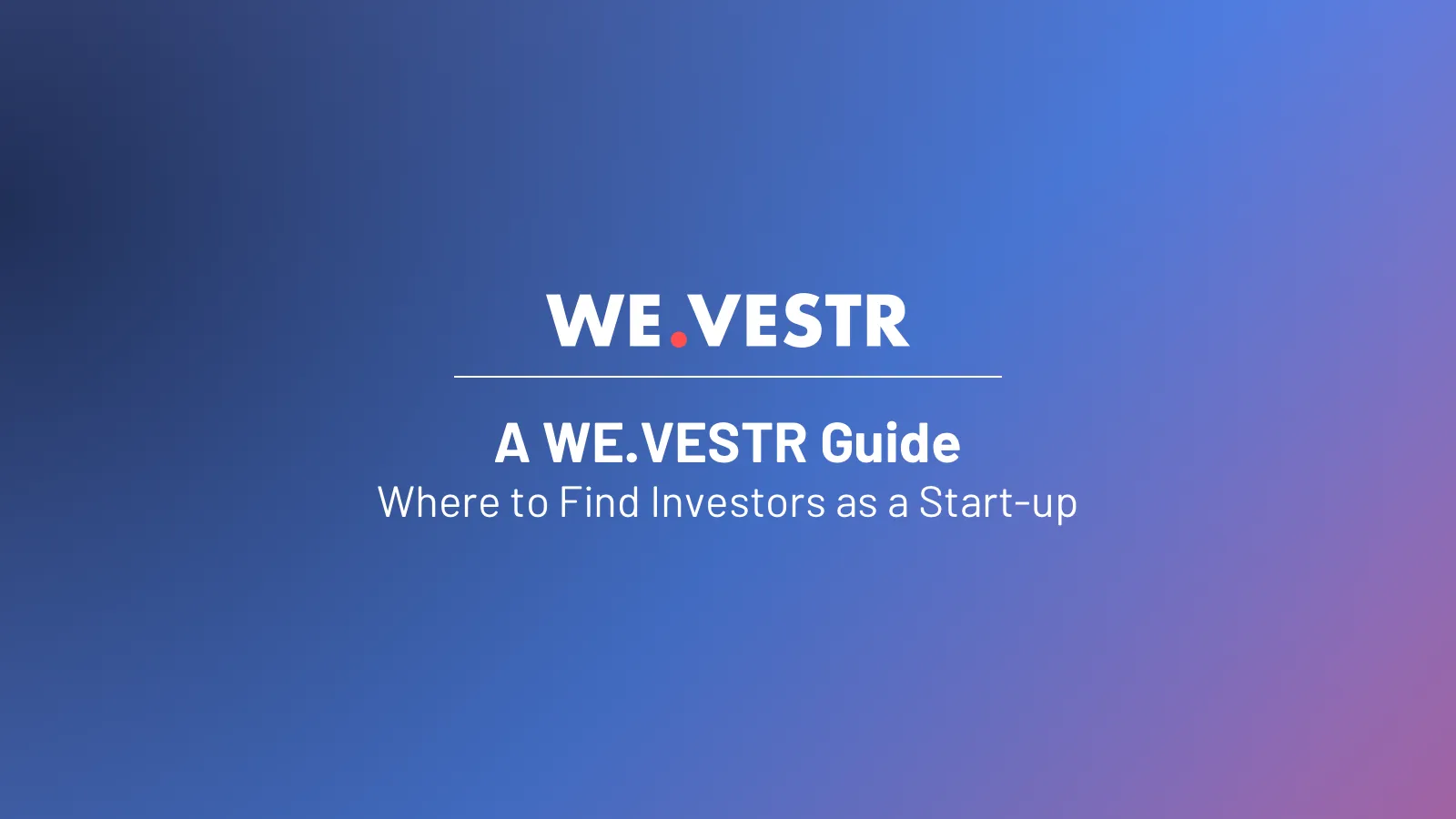Where to Find Investors as a Start-up (A WE.VESTR Guide)

We here at WE.VESTR, believe that entrepreneurship is accessible to everyone and not just those who have enough funds to bootstrap their own business all the way. That’s why we’ve put together this guide on where to find investors as a start-up, including what investors might look like, what they are looking for and how to choose an investor that will benefit your business.
When is it time to start thinking about investors?
It's never too early in the game; whether you're a startup or an established business with an ambitious plan, growing your business is one of the first things on your mind.
Investors are a great way of getting there, providing not only a cash boost for your business but expert guidance and an invaluable network too.
However, they don’t come cheap. In fact, getting an investor on board can be tricky. And, it's one of those things that you want to get the right first time around; not least because if you get in too deep, you might never be able to recover your business from such big financial backing in future. Once you give away equity stakes and/or percentages of your company away, it's incredibly hard to take them back! A typical equity investor is looking for a minimal stake, the higher the investment, the more shares you will be required to give away.
Before approaching investors, you should think carefully about why you want the money and what you will achieve with it. How viable is your business plan, and where are the risks? Think about how will you minimise the risks, whether the funding is enough to meet all costs involved in the project and how will you react to someone else having a say in how you manage your business.
The different types of investors
There are three main types of investors when it comes to raising money for your start-up: angel investors, equity investors, and venture capital.
Private Investors
Private investors are a key source of start-up capital for new businesses, as well as a great source of long-term investment for scaleups too.
- Angel investors are private individuals investing their own money; they can also act as a guide or mentor, often having business experience. They can be affiliated or non-affiliated with your business and can act alone or choose to invest as a part of a syndicate. It's important to note that Angel investors make their own decisions about their investments, weighing the merits of the proposal and the company.
- Venture capital investors invest other people’s money and are a type of equity investor. The difference is that venture capitalists are professional investors and they make large investments, sometimes millions of dollars, into startups with very high growth potential or companies that have already proved their model or product in some way. It's best to seek out venture capital if you're looking for a long-term investment with immediate help scaling your business since these firms provide support in areas such as sales and marketing in addition to providing capital.
- Equity investors provide you with money upfront in exchange for taking equity in your business. While equity investors can be easier to find because they are professional investors looking for investment opportunities, the fact that they are buying shares in your business provides them ownership of your company's decisions and voting rights on how you run your company from day to day.
Other types of Investors
- Angel investment groups, Angel investor syndicates, or angel groups are informal groups of angel investors who pool their money together and provide funding for start-ups in exchange for equity in your company. This is an alternative for start-ups to obtaining funding from just one investor because it allows you to ask for less capital upfront and makes finding more angels easier since you can reach out to multiple angels at once through an angel group.
- Venture capital trusts (VCT) are another form of equity investment for start-ups - VCTs provide access to government-backed funds without all the paperwork needed for applying directly to government schemes.
- Public listing is when a company opens up its equity to the public by listing shares on public stock exchanges. This is a method largely adopted by established corporate companies but Initial Public Offerings (IPOs) can be made by startups too. If this is something you want to pursue, consult with professionals like attorneys and accountants before making any decision to ensure everything will go smoothly.
How to find your investors
Your accountant or bookkeeper can advise you on where you might be able to apply for seed grants and other types of funding like start-up accelerators or pitch contests. They'll also be able to tell you how much money and time you're likely to need to invest in order to launch the next stage of your business, what kind of experience is required, how long it will take, and the likelihood of success. Some common methods of gaining investors include:
- Start-up accelerators offer mentorship, seed funding, and connections within the industry which is especially helpful if you don't yet have an established network in your industry.
- Pitching contests offer quick wins with substantial prizes offered by major organizations like Google and Facebook
- Crowdsourcing offers rewards via crowdfunding sites like Kickstarter or GoFundMe.
- Initial Public Offerings
How long can it take to find investors?
Finding investors can take weeks or months of research and networking, depending on what type of investor you're looking for. It's important to be prepared with your company's best foot forward and be knowledgeable about the different types of investors so you can target the right one for your needs and goals.
When you have a clear roadmap of the type of investor you want to attract, think about how you will communicate KPIs, wins and losses with your investors so that are reassured of your business plan and any contingency plans you may need to implement.
Calculating a fair price for shares
Now that you know where to find investors, you need to work out a fair price for shares. This depends on the route you are taking to find investors but ultimately, you have to agree on what you and your business partners agree is a fair exchange for investment, whether that be 50% of the company or 10%. There are lots of factors that will affect how much you value your company. Firstly, what is the cash value of your company, and what personal investment have you committed to date? Secondly, how much do you estimate the value of your company will grow with this investment, is the stake in the company worth the proportion the company will grow by? Finally, how many investors are willing to invest? You want to be sure that the ratio of shares equates to the investment made by each group or individual. Our Slicing Pie Calculator is the perfect tool to help you distribute equity.
Choosing an investor
Finding investors can be hard, and different types of investors will want different things from your company so it's important to do your research and ask questions before you take on any investment partners. The best way to start looking for an investor is by talking with the people in your network – find out which type of investor they are, what they've done in the past, and what they're looking for in new investments. You can use this information to align with your own goals as a start-up, whether that be a cash influx only or someone who can help steer your business in the right direction.
What do investors look for?
Investors want to be reassured that your business model is viable and see your plans for growth.
You will want to have a killer pitch and business plan ready for any potential investors, be sure to include information about your business, its USP, your goals and how you plan to make money; in addition, make sure you include all financial statements and forecasts.
Your pitch will need to include your concept for growth, the resources you have and will need to get there, the marketing mix you plan to use and a forecast showing the return your estimate from these efforts, whether that's in revenue, units sold or sign-ups.
Common challenges with fundraising
Raising money is hard and there are many challenges that you will face along the way, some of which include convincing investors that your idea is worth investing in, understanding what type of investor you need for your project, and finding someone who has the time to invest in your start up. This can be particularly difficult when you are still trying to figure out how your business should work.
The most common challenge faced by start-ups seeking investment funding is poor preparation, whether that's a hastily put-together business plan or lack of research into the tools and resources needed to make the investment viable and by extension, the amount of financing needed.
Next steps
Once you have your business plan and pitch ready and have finalised your first round of funding, you will need to start thinking about how you will manage the relationship with your investors going forward.
WE.VESTR's platform offers a one-stop solution for sharing your company's documents, KPIs and managing shareholders, helping to ensure that you keep your hard-earned investors happy and committed to your vision as your business grows. Request a demo today to find out more.

